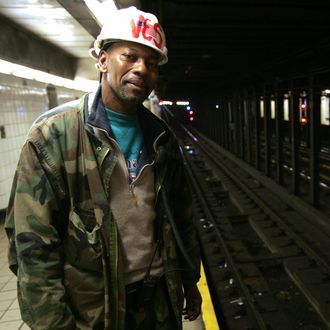
Remember the subway hero? (Not the 30 Rock one.) Wesley Autrey saw a man fall onto the tracks, and without hesitating he jumped in front of a speeding train to save the stranger’s life. What drives a heroic act like this one: Is it a moment of conscious thought, to gather your nerve and bypass the fear? Or is it all instinct?
David Rand, a Yale University psychologist, sought to answer that question in a new study examining similar acts of extreme altruism. “I think a lot of people have the assumption that people are sort of selfish at heart, and so they have to use self-control to get themselves to do the right thing,” Rand said. “But I didn’t believe that.” And his research, published online today in PLOS ONE, confirmed his hunch. People who perform heroic acts seem to do so instinctively, risking their lives to help someone else without giving the consequences much conscious thought.
Rand and colleagues collected TV, newspaper, and radio interviews from 51 recipients of the Carnegie Hero Medal who had risked their lives to save another person, usually a stranger. Study participants then read those statements and rated them on whether the Carnegie Heroes acted after a period of deliberation, or if they acted on intuition. Overwhelmingly, the participants reported that the heroic actions seemed to have been triggered by intuition, not conscious thought. Here are a few examples of those statements from the paper:
Christine Marty, a 21-year-old college student, rescued a drowning 69-year-old trapped in a car during a flashflood, and stated, “I’m thankful I was able to act and not think about it.”
Daryl Starnes, a 70-year-old man, climbed into a burning vehicle to rescue a 48-year-old woman trapped inside after a car accident, and stated, “I just did what I felt like I needed to do. You don’t think about someone making that big a deal out of it.”
Kermit Kubitz, a 60-year-old man, witnessed a man in a bakery stab a 15-year-old girl without provocation, and immediately engaged the man and was himself stabbed. He stated, “I had only two thoughts: one, I have to get him out of the door, and two, Oh my god, this guy could kill me, too. I ended up on my back with the knife in my ribs. I think it was just instinct. Kind of like my tendency, that nobody in my platoon is going to get attacked without me doing something. If it were my daughter, you’d do it for me. You’d do it in an instant. And I’d do it for you.”
We call actions like these heroic, but in a sense, they’re really just exaggerated instances of cooperation, Rand said. He explained that this new finding mirrors what he’s found in the lab: putting people under time pressure seems to cause them to act more cooperatively. And, actually, that instinct is kind of explained by selfishness. “Most of the time, it’s actually in our self-interest, in the long run, to be cooperative,” he said. “If we cooperate with people today, they’ll be inclined to cooperate with us tomorrow. So people get in the habit of being helpful and have that as their default.”
This means that even when we find ourselves in a situation where it may not be in our best self-interest to help someone out — as in, you’re risking your life, and for a stranger who’ll probably never reciprocate the action — it doesn’t matter. Heroism seems to come from habit.
That’s not to say that everyone, when placed in a similar situation, would act heroically. “There are a lot of individual differences in people, in how cooperative they are and how helpful they are,” Rand said. “And part of that could be because of the daily experiences people have. So, if you work in a company where maybe what’s rewarded is backstabbing in order to climb the ladder — that could get you into a habit of acting selfishly. Or, if you’re a very deliberative person, you’d maybe stop and think this through, and decide it’s not worth the risk.” This study didn’t look at the personality characteristics that add up to a hero, but this research suggests that when heroes do act, they act on instinct.




